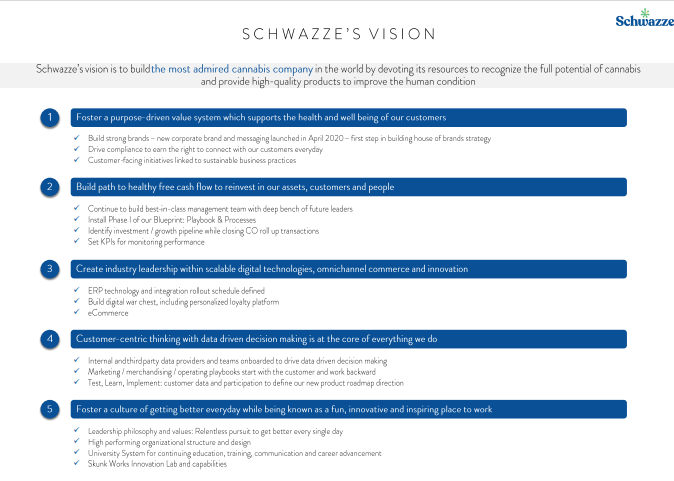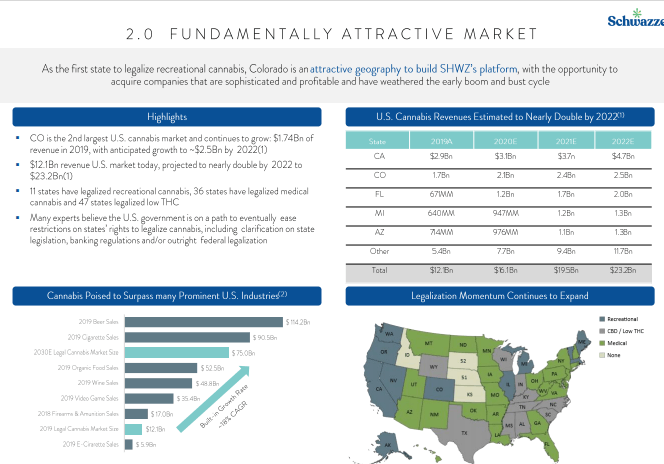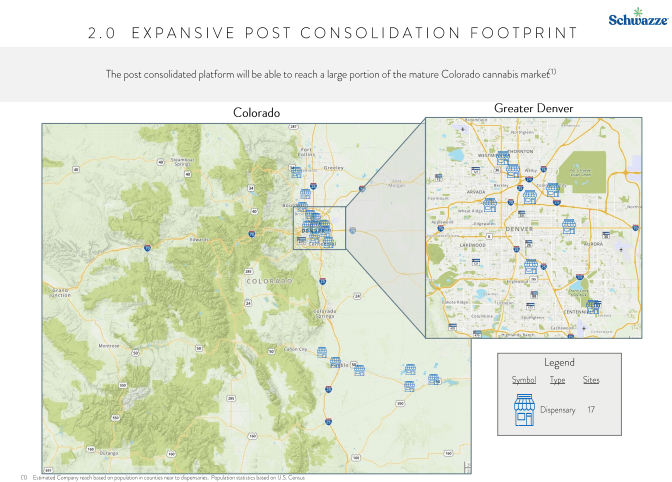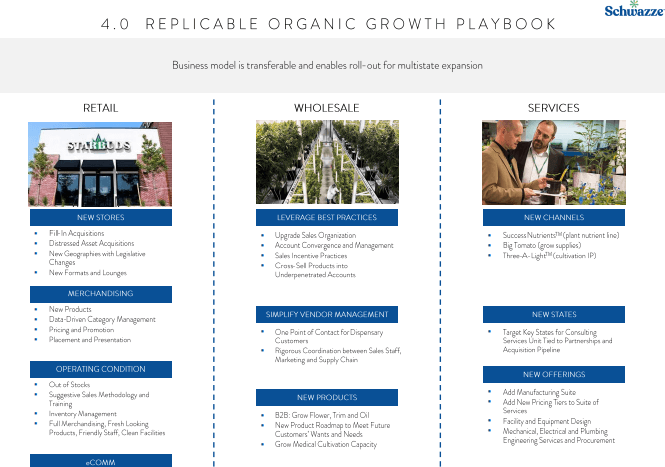Schwazze (SHWZ) - Cannabis Investing for Grown Ups

Interview with CEO Justin Dye of Schwazze
We caught up with Justin Dye, chairman and CEO of Schwazze, the largest cannabis company in Colorado. He shared with us what’s going on not only with his company but with the dynamic and evolving cannabis industry in the U.S. as well.
Company Overview
Schwazze is a vertically integrated cannabis company located in Colorado, USA. It is the parent company of a diverse portfolio of cannabis businesses comprising seed to sales and all parts between such as cultivation, consulting, nutrients and supplies. The company is focused on data-driven belief that cannabis products can enhance and improve many aspects of the human condition. The business model is guided by customer-centric thinking.
Schwazze was formerly known as Medicine Man Technologies. The company is publicly traded on the OTCQX under the SHWZ symbol.

Leadership Team
The company's leadership team has deep expertise in mainstream retail and product development at Fortune 500 companies as well as in the cannabis sector. Working with Dye are CFO Nancy Huber and COO Nirup Krishnamurthy. Other company leaders include Dan Pabon, General Counsel; Jim Parco, President Schwazze Biosciences; Todd Williams, Sr. Strategic Advisor; Collin Lodge, Vice President Retail; Julie Suntrup, Vice President Marketing; David Kaufman, Vice President Manufacturing; Jeremy Bullock, Vice President, Commercial Sales; and Ryan Schuelke, Cultivation Director. A six-person board of advisors assists with governance.
Schwazze: The Name
The etymology of the company name is revealing. Schwazze refers to a cultivation technique that prunes the living plant to promote growth. Dye related that in practice it is the de-fanning of plants during the growth cycle to basically get rid of the leaf structure, so the actual stem and the root system can grow, broaden, and get more nutrients.

The Cannabis Business
Dye shared with us that the cannabis business has evolved from a ‘Wild-West” nascent phase into a professionally run, very large industry that will be equal to if not larger than the wine or spirits business down the road. Much like their alcohol-industry predecessors in the early 1900s, when alcohol was in its prohibition stage with the Volstead Act, they’re in a similar position. Dye believes that the U.S is very close to taking all the reins off the intelligent use of cannabis and for it to be legal in the vast majority of states.
Schwazze believes that cannabis does a lot of good things for people, whether it is used for arthritis, headaches, cancer, anxiety, or other ailments. In addition, it simply occupies a niche for social needs, such as when going to watch a movie, a sporting event, or a live show. It’s proving to be an important part of American life and you’re seeing a lot of consumers coming into the market. Furthermore, the industry is starting to see more women coming into what’s historically been more of a male-dominated domain.
Colorado has been at the forefront of the cannabis revolution in the U.S. The state has very stringent rules and regulations about legal growth versus the illegal market, so it’s very easy to do business here. Denver, for example, is the second-largest cannabis market in the U.S.

What Makes Schwazze Special
Given that the cannabis industry is still in its early phases, Dye wanted to give us some insight on why his people and company are a cut above the rest. From his point of view, he believes that his company has the following superior qualities:
- People who have great perspectives on products, plant biochemistry, and tetrahydrocannabino (THC) content, how and where the flower is grown, and what sort of phenotypes and strains it came from.
- Individuals who know how to develop strategy and develop a vision around building a company blueprint, and on how you want to run retail dispensary stores, seven days a week, 365 days a year.
- · A team that's got great financial discipline, understanding what cost structures are, knowing how to budget and, importantly, how to get operating leverage once the business starts growing.
· A group that knows how to be good stewards of capital.
Dye himself, who became CEO of Schwazze in 2019, started his career doing process, strategy, and technology consulting, at Arthur Anderson. He then moved to General Electric where he works on M&A initiatives. Then he moved on to a private equity firm in New York, where he took a very large vertically integrated food retailer, Albertsons Companies, and took them private in 2006. Once restructured, that business grew from $3Bn to over $60Bn in revenue, and from $75M of earnings before interest, taxes, depreciation, and amortization (EBITDA) to $3.5Bn of EBITDA over an 11-year span. Many of his former team members are now here with him at Schwazze.
He and his group have put their money into the enterprise as well. They have close to $45M invested in this business.

Cannabis Legalities and the Schwazze Team
Currently, cannabis legislation is evolving at the national level and in almost every state in the U.S. Dye believes that the team that he has assembled is up to the challenge.
Nirup Krishnamurthy, the company’s COO, has a Ph.D. in decision sciences and was a partner at Dye Capital. He was the chief restructuring officer at the A&P retail grocery chain and took a ton of cost out of that system during its bankruptcy process. He was also the chief information officer for United Airlines and helped restructure it after the 9/11 attacks. He’s got a great operating background, knows how to drive retail and supply chains, and how to get the team to buy into the business model.
Todd Williams ran corporate development and M&A at Albertsons, a national grocery chain, and was key in growing that business from 192 to 2,300 stores. He was responsible for underwriting acquisitions. One of these acquisitions was the Safeway grocery-store chain, which essentially doubled Albertsons business.
Nancy Huber, the CFO, has an engineering degree from Purdue and has an MBA from the Northwestern University Kellogg School of Business. She’s put in a disciplined budgetary process at Schwazze.
Dan Pabon, the general counsel, was actually the person who put the rules in place in Colorado on how to regulate cannabis. He was in the Colorado House of Representatives where he was asked to lead that effort. He’s consulted all over the country and all over the world on how to set up cannabis regulations. He has a great relationship with state officials, the governor, the mayor of Denver, and is well thought of in Washington D.C. as well.
The Opportunity: Building a $1 Bn Business
Dye told us that he has a serious mandate: To build a $1 Bn enterprise at Schwazze. Part of the process was to build their first-tier team. The ability to get things done quickly is absolutely essential at this phase in the company’s existence, said Dye. The company’s competitive advantage is their team’s ability to identify, underwrite, close deals, and then integrate them into the business.
The company aspires to be a billion-dollar business. In Colorado alone, they expect to become a $500 to $600 M business. Dye expects revenues to grow to approximately $2.5 Bn by 2022.
Their charge is to become a super-regional company in a geographic area where they can share best practices. They intend to move store directors and general managers around. The company’s ambitions call for running manufacturing plants, cultivation locations, and moving skills and practices around in the geographic area, so that they can continue to manage Schwazze’s culture effectively. That’s how they want to compete and win.
They are going to aggressively open retail stores all over Colorado. That includes the Denver metropolitan areas and all the way up through the Interstate 25 north-south corridor. In order to rapidly accomplish that they will deploy an energetic ground game. They intend to have real estate personnel building relationships with commissioners, mayors, and town councils all through the state to find and obtain new licenses and stores, and to acquire independent retailers looking for a change.
This will be a big challenge, in large part because retail businesses can be hard to make successful, according to Dye. It is particularly hard for a small operator, who must keep up with companies that have a much larger size and scale, which enables the larger entities to rotate talent in and out as well as outspend smaller competitors.

The Schwazze Business Blueprint
To meet that challenge, Schwazze has developed a business blueprint that calls for the building out of a network of outlets throughout the state of Colorado. They will then bring their own cannabis flower in, which is of much higher quality and sells at a much higher margin, than other-sourced plants. They will also create Schwazze-store brands and products, whether it is pre-rolled cannabis, concentrates, or other sought-after products, into the stores; This will enable them to build loyalty and a reputation of quality as they roll out the distribution network. Shortly after that initial phase, they will begin offering a spectrum of more premium products, and develop a product flow to other independent retailers.
A look at the numbers driving the blueprint reveals why it is imperative that Schwazze stay a self-supplier using their own-grown cannabis. Wholesale cannabis price today is approximately $1,200 per pound for select grades or middle-tier flowers. Schwazze can produce flowers indoors between $400 and $500 per pound, between $150 and $250 per pound in the greenhouse, and for less than $100 per pound outdoors. The variation in cost structure is quite significant for business margins.
They have a proprietary growing methodology called “Three A Light”. The moniker stems from the fact that for every indoor light at a growing facility, they can increase their yield up anywhere from 100% to 300%.
Simply stated, Schwazze wants to hedge. They would like to have 50% of their own-flower capabilities grown within their own system, and then they’re sourcing the remaining 50% with really exceptional growers that are cultivating and developing strains that they and customers want.
Then there’s the wholesale part of their business. Schwazze is the largest wholesaler of cannabis distillate in Colorado today with a little over 20% of the market. They process a 90%+ distillate that they sell B2B by the kilogram to manufacturers.

Are Bricks-and-Mortar Outlets Really Viable?
The Schwazze blueprint relies heavily on physical retail outlets, yet back about 20 years ago the mantra was that bricks-and-mortar businesses were on the way out. Internet businesses were to be the wave of the future.
Dye had two comments about that notion. Firstly, they want to be able to meet the customer where the customer would like. Occasions dictate how people shop. Often, in retail, people want to go to a store and pick out some variety for the weekend or special occasion. In other cases, they want their cannabis to be delivered. So, in addition to brick-and-mortar outlets, they intend to build an all-encompassing delivery capability that includes curbside pickup, same-day delivery, or next-day fulfillment. In fact, they are already delivering in Aurora, Colorado and learning quite a bit by analyzing those sales and interactions.
Secondly, the way it’s currently set up in Colorado is that cannabis must be purchased from a brick-and-mortar store. If delivery is desired, then fulfillment originates from a brick-and-mortar store. A new cannabis business cannot come into Colorado with the Amazon model in which they’re going to set up these delivery centers and ship all over the state. The anchor point of the retail cannabis ecosystem in Colorado is the brick-and-mortar dispensary.
Adult, Recreational, or Medicinal Cannabis?
On an additional note for investors, cannabis terminology may be confusing to the average person. “Adult-use” and “recreational-use” are two terms that are essentially interchangeable, at least in America, when speaking about cannabis. Schwazze uses the terms “adult” and “recreational” synonymously, generally following the customer’s preference.
Then there is the medicinal-use side, in which cannabis is used to treat specific diseases and disorders. Dye certainly sees the potential for medical-weed dispensaries, and they will add a few of those in certain areas on a select basis, especially in those jurisdictions that only allow medical Cannabis. However, his experience is that once an area has adult use, the market swings dramatically over to the recreational side. On the medical side they can buy bigger quantities of THC without any taxes, but in general what you see is a migration from medicinal to recreational over time.
M&A Strategy
Schwazze has been quite acquisitive as they rapidly grow out their business. Dye uses a highly systematic approach in acquiring and integrating other businesses. It starts by looking at the state of Colorado, putting all the stores on a map, and pulling metric reports. They evaluate who has the most volume out of their dispensaries. They compare that versus their stores to determine if any of them represent a potential M&A target. Can they grow density and market share by making the acquisition?
Then they look at their own internal capabilities: Can they run their playbook and operate their blueprint at these locations? Do they have the staff available to manage that outlet? If the answer is yes and there is synergy, then they consider moving forward. Timing is important as well: Is there going to be an 18-month romance or is this going to be something that they can get accomplished in 2 to 3-months? Schwazze has a synergy-realization office that is run by their data science group, and all M&A candidates must pass through their muster.
Cash Raising and Stock Listing Possibilities
Typically, Schwazze has been buying companies for cash. They look for companies anywhere from 2 to 5 times EBITDA. Schwazze currently sits on $21 M in cash. They are currently generating free cash. Some of these acquisitions will be paid out of the balance sheet from cash flow generation. For larger buy-outs, they may need to raise some capital.
The good news is the cost of capital is coming down. Additionally, with the size and scale that they have, they’re attracting more pools of capital. Dye believes that should they have to raise capital, the markets are open for them.
As far as listing on various marketplaces goes, there is a bit of regulation to overcome. Because cannabis is a schedule 1 drug at the U.S. Federal level, as a U.S. operator of plant-touching operations, they do not have access to the NASDAQ or the New York Stock Exchange. There are other exchanges outside of this country where they can, particularly in Canada. Dye indicated that that may be interesting and something that they could explore.

To find out more, go to the Schwazze Website
Analyst's Notes




Subscribe to Our Channel
Stay Informed











